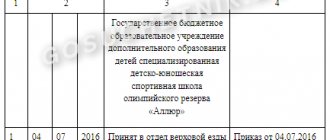Features of hiring
Hiring for work related to the movement of vehicles is carried out in accordance with the requirements of Art. 328 Labor Code of the Russian Federation. In particular, hired employees must undergo professional selection, vocational training and mandatory preliminary medical examination in the manner prescribed by law.
Persons under 18 years of age are not allowed to work in the profession of “driver” (parts 1 and 3 of Article 265 of the Labor Code of the Russian Federation; clause 2111 of the List, approved by Decree of the Government of the Russian Federation of February 25, 2000 N 163 “On approval of the list of heavy work and work with harmful and dangerous working conditions, during which the employment of persons under eighteen years of age is prohibited”).
When hiring a driver, in addition to the documents provided for in Art. 65 of the Labor Code of the Russian Federation (passport, work book, military ID and others), the applicant must present a driver’s license. It confirms the required level of his qualifications and gives the right to drive a vehicle of a certain category (Clause 4, Article 25 of the Federal Law of December 10, 1995 N 196-FZ “On Road Traffic Safety”; hereinafter referred to as Law N 196-FZ). There are two types of driver's licenses - Russian national (we encounter it most often) and international (it is necessary to drive a vehicle abroad). Samples of driver's licenses and the procedure for their issuance are approved by the following regulations:
Order of the Ministry of Internal Affairs of the Russian Federation dated May 13, 2009 N 365 “On the implementation of a driver’s license”;
Order of the Ministry of Internal Affairs of the Russian Federation dated April 18, 2011 N 206 “On the implementation of the international driver’s license”;
Decree of the Government of the Russian Federation of December 15, 1999 N 1396 “On approval of the Rules for passing qualification exams and issuing driver’s licenses”;
Instructions on the procedure for organizing work on taking qualifying exams and issuing driver's licenses in the divisions of the State Road Safety Inspectorate of the Ministry of Internal Affairs of the Russian Federation, approved. Order of the Ministry of Internal Affairs of the Russian Federation dated July 20, 2000 N 782.
The personnel employee needs to pay attention to the relevance of the driver's license - national licenses are issued, as a rule, for a period of ten years, international ones - up to three years, but no more than for the period of validity of the national license (clause 6 and clause 8 of Article 25 of Law N 196-FZ).
From May 9, 2014, persons with licenses issued in a foreign state will no longer be able to work as drivers (this applies to both national and international licenses). The corresponding norm was introduced in paragraph 13 of Art. 25 of Law No. 196-FZ. An exception is when a vehicle participates in international traffic (clause 17 of the same article). This restriction was adopted due to the high number of road accidents involving foreign drivers. Employers who employ drivers who do not have Russian licenses will be subject to administrative liability in the form of a fine of 50 thousand rubles (Article 12.32.1 of the Code of Administrative Offenses of the Russian Federation).
Additional requirements apply to drivers transporting dangerous goods. They must undergo training at an educational institution for additional professional education of specialists or an educational division of an organization that has a license for educational activities and is authorized to train drivers of vehicles transporting dangerous goods. Information about the register of such educational institutions is posted on the official website of the Federal Service for Supervision of Transport. At the end of the training program, the driver passes an exam and receives a certificate of admission to transport dangerous goods from the territorial Department of the State Traffic Safety Inspectorate at the place of residence or training. The procedure for conducting training and issuing certificates was approved by Order of the Ministry of Transport of Russia dated 07/09/2012 N 202 and the Instruction on the procedure for registration and issuance of certificates for the training of drivers of vehicles transporting dangerous goods, approved. by order of Rostransnadzor dated 09/03/2013 N AK-966-FS.
Before hiring an employee as a driver, you need to make sure that he has no medical contraindications to performing such work.
Driver medical examinations
On March 31, 2014, the Federal Law of December 28, 2013 N 437-FZ “On Amendments to the Federal Law “On Road Safety” and the Code of the Russian Federation on Administrative Offenses on Medical Provision of Road Safety” came into force. The document defined the concepts of different types of inspections, specified the procedure for their organization and financing, and assigned responsibility for violation of established requirements.
The following types of mandatory medical examinations are established for persons working as drivers:
- preliminary (carried out before drivers are hired);
- periodic (carried out during the entire working time of drivers - at least once every two years, and for persons under the age of 21 - annually, in accordance with Part 1 of Article 213 of the Labor Code of the Russian Federation);
- pre-trip (conducted during the entire working time of drivers, with the exception of emergency services drivers);
- post-trip (carried out during the entire working time of drivers whose work involves the transportation of passengers or dangerous goods).
- The above types of medical examinations are carried out at the expense of the employer.
In addition, a medical examination is carried out before obtaining a driver’s license for the first time, as well as in cases of its replacement due to expiration or return after expiration of the period of deprivation of rights. These medical examinations are carried out at the driver's expense.
Mandatory medical examinations can be carried out by organizations of different forms of ownership and management that have a license for medical activities to provide relevant services (perform work). Examination of a psychiatrist and a psychiatrist-narcologist is carried out only in specialized state and municipal healthcare institutions. Mandatory pre-trip and post-trip medical examinations are carried out either by hired medical workers, or in the manner prescribed by Part 4 of Art. 24 of the Federal Law of November 21, 2011 N 323-FZ “On the fundamentals of protecting the health of citizens in the Russian Federation.”
Important. Instructions on the procedure for organizing work on taking qualifying exams and issuing driver's licenses in the divisions of the State Road Safety Inspectorate of the Ministry of Internal Affairs of the Russian Federation, approved. Order of the Ministry of Internal Affairs of the Russian Federation dated July 20, 2000 N 782, reads:
"15.3. The availability and validity period of a medical certificate of fitness to drive vehicles of those categories, the right to drive which is requested by the candidate driver, is checked.
For information, the State Inspectorate maintains a list of medical institutions located in the serviced territory and issuing the specified certificates.
In case of submission of a medical certificate issued by a medical institution not included in the above list, a request is sent to this medical institution or to the relevant unit of the State Inspectorate to confirm the issuance of this certificate.”
Based on the results of a mandatory preliminary or periodic medical examination, the driver is issued a medical report on the presence or absence of medical contraindications to driving a vehicle. The law establishes that the conclusion is prepared in two copies, one of which is stored in the medical organization, and the second is handed over to the driver for presentation to the employer, where it will subsequently be stored.
Violation of the procedure for conducting mandatory medical examinations entails the imposition of an administrative fine on citizens in the amount of 1000 to 1500 rubles, on officials - from 2000 to 3000 rubles, on legal entities - from 30 thousand to 50 thousand rubles. Liability is established by Law No. 437-FZ. Changes are being made in the form of a new article - 11.32 of the Code of Administrative Offenses of the Russian Federation.
The procedure for conducting mandatory medical examinations is determined by the following documents:
The procedure for conducting mandatory preliminary and periodic medical examinations (examinations) of workers engaged in heavy work and work with harmful and (or) dangerous working conditions, approved. By Order of the Ministry of Health and Social Development of Russia dated April 12, 2011 N 302n;
Order of the USSR Ministry of Health dated September 29, 1989 N 555 “On improving the system of medical examinations of workers and drivers of individual vehicles.”
While the employee undergoes a medical examination, he retains the average earnings at his place of work (Article 185 of the Labor Code of the Russian Federation).
Sample driver job description
APPROVED by: General Director of Supply Wholesale LLC Shirokov /I.A. Shirokov/ August 12, 2014
Job description of a car driver
I. General provisions
1.1. This document regulates the list of job functions, tasks, responsibilities that the driver of the organization must perform, as well as his rights, responsibilities, working conditions and other parameters.
1.2. The driver of the organization must have at least secondary education, at least three years of driving experience, as well as a category “B” license.
1.3. Hiring and dismissal occurs in the manner prescribed by the internal rules of the organization and with the obligatory presence of a corresponding order from management.
1.4. The driver's immediate supervisor is the director of the enterprise.
1.5. If the driver is absent from the workplace, his duties are transferred to a person appointed by a separate order of the head of the company and who has the required level of education and work experience.
1.6. The driver must be familiar with:
- laws of the Russian Federation in the field of civil and labor law;
- internal regulations of the organization, labor protection standards, fire safety, etc.
- Charter of the organization;
- orders and directives of management, company regulations;
- traffic rules, penalties for certain traffic violations;
- road maps of the region.
1.7. The driver must own:
- complete information about the internal structure of the car, the principles of its operation;
- information about the equipment of the car, its technical characteristics, instruments, mechanisms and assemblies, as well as about their purpose and maintenance;
- ways and methods of identifying faults, as well as eliminating them using improvised means;
- knowledge about the consequences of certain breakdowns and malfunctions in the engine and other vehicle systems;
- standards for the maintenance of vehicles, including washing, cleaning the body and interior, maintenance in the garage, etc.
II. Job responsibilities of a car driver
2.1. The driver's job functions include performing the following tasks:
- driving,
- timely arrival at the workplace and delivery of the car to the entrance of the organization, as well as placing the car in the garage after the work shift;
- timely refueling, topping up oil, and adding other fluids necessary for the operation of the car;
- following traffic rules, observing all road signs, timely familiarization with all changes made to the traffic rules by law;
- ensuring the safety of passengers while driving and driving;
- ensuring the safety of property located in the trunk of a car;
- monitoring the safety and integrity of the vehicle itself, including leaving it in parking lots and lots only with the alarm on, locking all doors and windows both while driving and during stops;
- daily inspection of the technical condition of the car, timely elimination of identified faults on our own or with the help of specialized car services;
- keeping the car clean and tidy, including daily morning washing of the car at a car wash and weekly dry cleaning of the interior;
- advance preparation for long trips, familiarization with the area map and road maps, selection of the shortest routes;
- avoiding the use of any medications, drugs, products and liquids that can affect the driver’s performance, concentration, coordination of movements and reaction;
- work with route and waybills, including entering information into documents on mileage, gasoline and oil consumption, travel destinations, etc., timely provision of documentation for reporting;
- carrying out orders and instructions from the immediate supervisor.
- careful attitude towards the entrusted vehicle.
III. Rights
3.1. The driver has the following powers and rights:
- make reasoned and substantiated proposals to management for improving and optimizing the work of both yourself and the organization as a whole;
- make decisions independently to ensure the safety of both yourself and passengers when driving;
- require management to ensure occupational safety;
- receive all the necessary information from employees of car service companies about car repairs;
- make proposals for optimizing route traffic, incl. to reduce financial costs for travel;
- participate in any corporate events (meetings, discussions, gatherings) directly related to his activities;
- make constructive proposals to eliminate violations, errors, and shortcomings identified during the work process;
- enter into communications with representatives of any structural divisions of the company to resolve issues within its competence;
- refuse to perform work functions if there is a threat to life or health.
IV. Responsibility
The driver is liable in the event of the following violations:
4.1. Causing, intentional or unintentional, damage to the vehicles entrusted to him (engine, systems and assemblies, mechanisms and components, interior and body), as well as untimely service and maintenance,
4.2. Causing damage to the health of passengers and other road users;
4.3. Use of any prohibited or permitted substances that negatively affect coordination, thinking, reaction, etc.
4.4.. Neglect of performing labor duties, including complete evasion of them.
4.5. Regular violation of internal regulations, work and rest schedules, discipline established at the enterprise, as well as violation of any types of safety.
4.6. Failure to comply with orders and instructions issued by the organization’s management or immediate supervisor.
4.7. Disclosure of confidential information about the organization.
4.8. Providing false information to management in reporting documents;
4.9. These points of the job description strictly comply with the framework of the current legislation of the Russian Federation.
AGREED Head of the transport department of Supply Wholesale LLC Myshkin /Myshkin T.V./ August 12, 2014
R.S. Ivanov has READ THE INSTRUCTIONS. Driver of LLC "Supplies Wholesale" Passport 8735 No. 253664 Issued by the Department of Internal Affairs of the Leninsky District of Perm on September 14, 2012 department code 123-425 Signature Ivanov August 17, 2014
Working hours and rest hours
The general procedure for establishing working hours and rest time is determined by the Labor Code of the Russian Federation. The nuances associated with the specifics of driving work are reflected in the Regulations on the peculiarities of working hours and rest time for car drivers, approved. Order of the Ministry of Transport of the Russian Federation dated August 20, 2004 N 15. This document applies to drivers working in organizations of all forms of ownership, except for those who carry out international transportation or work as part of rotation crews. The specifics of working hours and rest periods provided for by the Regulations must be taken into account when drawing up work schedules (shifts) for drivers.
Work schedules (shifts) on the line are drawn up by the employer for all drivers on a monthly basis for each day (shift) with daily or cumulative accounting of working hours and are brought to the attention of drivers no later than one month before they come into effect. The schedule indicates the start, end and duration of daily work (shift), breaks for rest and meals, daily (between shifts) and weekly rest times. The work schedule (shift) is approved by the employer, taking into account the opinion of the representative body of employees.
Normal working hours for drivers cannot exceed 40 hours per week. In cases where, due to production (work) conditions, the established normal daily or weekly working time cannot be observed, drivers are provided with a summarized recording of working time with a recording period of one month. The duration of working hours during the accounting period should not exceed the normal number of working hours.
When recording working hours together, the duration of a driver's shift cannot exceed 10 hours (except in certain cases).
Drivers of passenger cars (except taxis) may have an irregular working day (taking into account the opinion of the representative body of the organization’s employees). The number and duration of work shifts according to work schedules (shifts) with irregular working hours are established based on the normal length of the working week, and weekly rest days are provided on a general basis.
Driving time cannot exceed 9 (in some cases - hours per day, and when working hours are taken together, it can be increased to 10 hours, but not more than twice a week. In this case, the total duration of driving for two weeks in a row cannot exceed 90 hours.
hours per day, and when working hours are taken together, it can be increased to 10 hours, but not more than twice a week. In this case, the total duration of driving for two weeks in a row cannot exceed 90 hours.
The driver’s working time, in addition to driving time, also includes other periods, in particular the time of pre-trip and post-trip medical examinations, parking time at loading and unloading points, time of work to eliminate malfunctions that arose along the way, and some others. The above periods may not be included in working hours in full: for example, the time of securing cargo and a vehicle is counted towards working hours in the amount of at least 30%, the time a driver is present at the workplace when he is not driving a vehicle, when sending two drivers on a trip - in an amount of at least 50%.
In the cases provided for in Art. 99 of the Labor Code of the Russian Federation, drivers may be involved in overtime work, but they should not exceed four hours for two days in a row and 120 hours per year.
Design nuances
The document is prepared by personnel department employees in two copies. After signing it, one of the copies is given to the employee, and the second is placed in his personal file.
The archival storage time of such a document is 75 years.
To avoid controversial situations, all information related to work activity is entered into the form. For example, the lack of data on fuel payment leads to claims from the driver.
In most cases, the document includes information on the probationary period (without it the employee will not be hired). The trial cannot exceed three months in duration.
Two types of documents are allowed: urgent (with a fixed or limited period of validity) or unlimited. Fixed-term employment relationships cannot exceed a period of 5 years.
As a rule, simultaneously with the signing of the contract, an additional agreement is drawn up on the assignment of responsibility for the entrusted property and values of the employer. The driver is obliged to be financially responsible for damage to vehicles and loss of valuables (for example, goods) that he transported.
The specifics of the employee’s activities must be reflected not only in the contract, but also in local documents, for example, instructions.
These documents should be referred to when introducing additional requirements into the contract. However, there is no need to describe in detail all the nuances of work activity. There are corresponding job descriptions for this.
If there are no separate job units in the state, their responsibilities can be assigned to the driver. For example, he can take care of the technical condition of transport, its appearance (we are talking about washing and cleaning), the organization of loading and unloading, the escort of goods and their transfer on behalf of an organization or enterprise.
Additional payments for a dependent to a pension - complete information. Read about receiving a labor pension for the loss of a breadwinner here. Reduction of staff - what to do in this case? Read in this article.
Is it possible to send a driver on a business trip?
In accordance with Art. 57 of the Labor Code of the Russian Federation, an indication of the nature of the work must be contained in the employment contract with the employee. Business trips of employees whose permanent work is carried out on the road or has a traveling nature are not recognized as business trips (Part 1 of Article 166 of the Labor Code of the Russian Federation). The driver’s work is traveling in nature (if the driver has the opportunity to return to his place of residence every day) or is carried out on the road (if this is not possible), therefore the official trips of these employees are not business trips. In accordance with Art. 168.1 of the Labor Code of the Russian Federation, drivers must be reimbursed for expenses associated with business trips, such as:
travel expenses;
expenses for renting residential premises;
additional expenses associated with living outside the place of permanent residence (daily allowance, field allowance);
other expenses incurred by employees with the permission or knowledge of the employer.
The procedure for reimbursement of expenses is established in a collective agreement, agreement, or local regulatory act (for example, in the Regulations on the traveling nature of work). The same document may establish an allowance for the traveling nature of the work (Letter of the Federal Social Insurance Fund of Russia dated 02.04.2010 N 02-03-16/08-526P).
When establishing the amount of such an allowance, you must be guided by:
Regulations on the payment of bonuses related to the mobile and traveling nature of work in construction (approved by Resolution of the USSR State Committee for Labor, the Secretariat of the All-Union Central Council of Trade Unions dated 06/01/1989 N169/10-87);
A list of professions, positions and categories of river, road transport and highway workers who are paid bonuses in connection with constant work on the road, the traveling nature of work, as well as during official trips within the areas they serve (approved by a resolution of the Council of Ministers of the RSFSR dated 12/12/1978 N 579);
industry agreements, in particular the Federal Industry Agreement on Road Facilities for 2014-2016. (approved by the All-Russian Trade Union of Automobile Transport and Road Workers, Rosavtodor, the Russian Association of Territorial Road Administration Bodies (RADOR Association), the All-Russian Industry Association of Employers in the Road Industry "ASPOR" 11/12/2013).
Restrictions when working part-time
It is impossible to apply for the position of part-time driver to persons who perform similar functions at their main place of work (driving vehicles or their movement). This restriction was introduced by Part 1 of Art. 329 of the Labor Code of the Russian Federation, as well as the “List of works, professions, positions directly related to driving vehicles or controlling the movement of vehicles,” approved. By Decree of the Government of the Russian Federation of January 19, 2008 N 16. A candidate for the position of “driver” can confirm the absence of such a restriction by providing a copy of the work book, a certificate from the main place of work, or indicating in his application for employment that his main activity is not related to management vehicles or their movement.
Fines for violations of the work and rest regime of drivers
The most common violations of the work and rest schedule of drivers are:
- the time limit for driving a vehicle has been exceeded;
- the standard working time for cumulative accounting has been exceeded;
- the driver is sent on a long trip without a replacement, especially at night;
- the manager did not draw up a work schedule for the driver.
Part 3 of Article 11.23. The Code of the Russian Federation on Administrative Offenses provides for the following fines for violating the work and rest schedule of drivers, namely for non-compliance with the norms of driving time and rest time:
- for the driver - from 1,500 to 2,000 rubles;
- for an official - from 7,000 to 10,000 rubles;
- for an individual entrepreneur - from 15,000 to 25,000 rubles;
- for a legal entity - from 20,000 to 50,000 rubles.
Check your organization's fines now
Material liability
It is impossible to conclude agreements on full financial liability with drivers, because this profession is not indicated in the list of jobs and categories of workers with whom such agreements can be concluded (List, approved by Resolution of the Ministry of Labor of Russia dated December 31, 2002 N 85). The conclusion of such an agreement is possible only if the driver is simultaneously assigned the functions of freight forwarding. However, even in this situation, he will bear full financial responsibility only in relation to the duties of the forwarder (decision of the Supreme Court of the Russian Federation dated November 19, 2009 N 18-B09-72). At the same time, the driver is obliged to compensate the employer for direct actual damage caused to the latter (Part 1 of Article 238 of the Labor Code of the Russian Federation). In this case, lost income (lost profits) is not subject to recovery.
Full financial responsibility rests with the driver in situations provided for in Art. 243 of the Labor Code of the Russian Federation, in particular, in the following cases:
the valuables were entrusted on the basis of a special written agreement or received by the driver using a one-time document;
the damage was caused intentionally;
the damage was caused while intoxicated (alcohol, drugs or other toxic);
the employee has committed a crime (established by a court) or an administrative offense (established by the relevant government agency);
the damage was not caused while the employee was performing his job duties.
Recovery of damages is a right, not an obligation of the employer; he can fully or partially exempt the employee from his compensation (Article 240 of the Labor Code of the Russian Federation). If the amount of damage does not exceed the average monthly salary, then it can be recovered by written order of the employer (Article 241, Part 1 of Article 248 of the Labor Code of the Russian Federation). If the amount of damage exceeds the average monthly salary, then it can be compensated either by the employee voluntarily or by court decision (Parts 2 and 4 of Article 248 of the Labor Code of the Russian Federation). The damage caused can be recovered regardless of whether the employee is brought to disciplinary, administrative or criminal liability (Part 6 of Article 248 of the Labor Code of the Russian Federation).
Specifics of the content of the employment contract
The form of the employment contract is practically no different from the standard one. It contains information about the parties, general provisions, rights and obligations of the company and the citizen, addresses, grounds for changing and terminating the contract. To compile it, you will need to provide a passport, SNILS, military ID, ID and medical book.
Prerequisites
The content of the contract is regulated by law, and there are a number of clauses that are included in the agreement in order for it to be considered legally valid. Mandatory conditions are specified in Art. 57 of the Labor Code of the Russian Federation, and these include:
- Place of work and working conditions.
- Guarantees and compensations.
- Work schedule determined for the employee.
- Features of work on non-working days.
- Duration of the contract.
- List of responsibilities.
- The procedure for issuing wages and its amount.
It is important to know! The level of requirements for the driver is determined by the type of transport with which he will work. The company warns about them in advance and checks the availability of qualifications before offering a contract for signing.
Despite the fact that the actual workplace is the cab of the car, the company office is indicated as the address. It is the responsibility of the employer to provide serviceable transport, with the exception of cases when a citizen rents out his car. He undertakes to keep it in good condition, and this concerns not only the technical side of the issue, but also the hygiene of the interior and cargo compartment. This is especially important in the field of passenger transportation.
Additional nuances
In addition to the main points, an employment contract with a freight forwarder driver may also contain additional points that reflect the specifics of the work and regulate controversial issues. They will differ in each individual case, as they are directly related to the type of travel. Typically the points cover the following points:
- Responsibility for ensuring the safety of cargo in transit.
- Maintaining and ensuring the operability of the vehicle not only on the road, but also in the intervals between shifts.
- Payment system taking into account night shifts and workdays and holidays.
- Additional job responsibilities (checking the integrity of packaging, monitoring loading and unloading operations, drawing up reports of shortages or damage to cargo).
If the car belongs to the driver, and he will perform his functions on it, then it will also be necessary to conclude a lease agreement for this vehicle, providing for depreciation compensation or a monthly fee.
Material liability
The driver is not a financially responsible employee, since this profession is not included in the list established by Resolution of the Ministry of Labor No. 85 of December 31, 2002. But specifying an additional clause in the contract is possible if the employee is simultaneously assigned the function of a freight forwarder. In case of loss of cargo or its damage, he undertakes to compensate the employer for the damage caused, with the exception of lost profits.
Situations when the driver is charged with financial responsibility are provided for in Article 243 of the Labor Code of the Russian Federation. These include:
- Intentional damage to company property.
- The valuables were entrusted to the employee on the basis of a written agreement, even if it was a one-time document.
- The damage was caused while the person was under the influence of alcohol or drugs.
- The employee committed an unlawful act, as a result of which he was given administrative or criminal punishment.
The employer has the right to recover damages, but this is not his responsibility, that is, under certain conditions, the citizen and release him from compensation. Compensation is carried out within the framework of wages; if the losses received are greater, then legal entities often go to court.
Work mode
Each driver hired for a position must have a schedule specified in the contract. It is drawn up by the employer indicating the beginning and end of the work shift, the time provided for rest and food, as well as days off. One of the following types of work scheme is approved:
- Daily accounting. In this case, the duration of the shift should not exceed 8 hours established by labor legislation.
- Summarized accounting. The length of each day differs, but the weekly norm cannot exceed 40 hours per week. There is an additional charge for processing.
Taking into account the fact that the work is traveling, hours worked are considered to be all spent on driving a car or truck, specialized rest breaks en route, downtime caused by no fault of the driver, and parking at loading or unloading points for the shipment. The law stipulates that to work 8 hours a person does not need to be behind the wheel all the time. They also include the periods necessary to conduct a full medical examination before the flight.
It is important to know! Some organizations are trying to shorten lunch breaks for delivery drivers at the expense of time for rest - this is considered a violation of the Labor Code of the Russian Federation.
Features of remuneration
The employment contract of an individual entrepreneur with a driver, as well as with a legal entity, must contain key payment terms. If the activity is related to an expedition, then on the basis of Art. 168.1 of the Labor Code of the Russian Federation, the employer reimburses the following travel expenses:
- Payment for gasoline, confirmed by receipts from gas stations.
- Purchase of lubricants based on established consumption rates.
- Expenses incurred en route for hotel rooms, supported by receipts.
- Daily allowance for staying on a long business trip.
Salaries are determined by each company individually, depending on the rate, nature of the work, category of driver’s license and complexity. A car, be it a taxi or a dump truck, is a source of increased danger. Therefore, working conditions must undergo specialized assessment. Based on its results, a citizen has the right to receive the following compensation payments:
- Reduced working hours (up to 7 hours).
- An increase to the established prices of at least 7%.
- Additional leave of up to 10 days, which is added to the annual paid period established by law at 28 days.
Attention! Benefits and compensation are established by internal regulations and can be duplicated in the employment contract. But this is not a mandatory condition, since the approved rules apply to all personnel of the enterprise.
Is the driver's consent required to change cars?
A common situation in practice is when the driver’s employment contract specifies that his workplace is a car of a certain brand and with certain license plates. At the same time, employers often explain the inclusion of this information in the employment contract as a requirement of Art. 57 of the Labor Code of the Russian Federation on the mandatory indication of the place of work in the employment contract. In fact, in the contract with the employee it is enough to write the name of the organization, and, if necessary, indicate the name and location of the branch, representative office or other separate structural unit. Including information about a specific vehicle in an employment contract will lead to the fact that in the event of its breakdown, sale, or if there is another need to transfer the driver to another car, the employer will be forced to enter into an additional agreement to the employment contract (Article 72 of the Labor Code of the Russian Federation). If there is no reference to a specific car in the employment contract, then in order to transfer the driver to another car, his consent is not required (clause 3 of Article 72.1 of the Labor Code of the Russian Federation).
Features of an employment contract with a driver depending on the type of transport
When filling out the contract, you need to take into account the specifics of the activity and the type of transport.
Taxi driver
The taxi driver works in irregular hours. A special work schedule is established, which includes night shifts. These points must be reflected in the contract concluded with the taxi driver.
Bus driver
When signing an employment agreement with a bus driver, the specifics of driving a vehicle are prescribed. The qualification requirements include a mandatory condition on the presence of categories D, DE, D1, D1E.
Truck driver
When transporting goods over long distances, it is impossible to establish a specific route. The citizen works in irregular working conditions. Therefore, guarantees and compensation in case of overtime and rest conditions are included in the contract with the truck driver. The obligation to have an open category of rights C, CE, C1, C1E must also be indicated.
If the driver operates a personal vehicle
When concluding an agreement with a driver who drives a personal car, you can additionally sign a contract for renting a vehicle. This is necessary to share responsibility and reimburse the citizen for the use of his vehicle.
What to do if the driver is unable to perform his duties due to health reasons?
If an employee, in accordance with the medical certificate issued to him, needs to be transferred to another job, the employer is obliged, with the written consent of the employee, to provide such work (Article 73 of the Labor Code of the Russian Federation). In practice, to do this, the employer sends a notice to the driver indicating the vacancies he has (both vacant positions or jobs corresponding to the employee’s qualifications, and vacant lower positions or lower-paid jobs) or informs about their absence. The employer is obliged to offer vacancies in other localities if this is provided for by the collective agreement, agreements, or employment contract (Part 2 of Article 83 of the Labor Code of the Russian Federation). In this notice, the employee must make a written note and indicate his consent or disagreement to perform work in one of the proposed positions. If the employee agrees to the transfer, the parties enter into an additional agreement to the employment contract on the transfer for the period specified in the medical report. If the employer does not have suitable vacancies, or the employee does not agree to the transfer, then the employer’s further actions depend on the period for which the employee must be transferred in accordance with the medical report.
If the transfer is necessary for a period of up to four months, then if there are no vacant positions or if the employee refuses the vacancies offered to him, the manager is obliged to suspend him from work for the entire period specified in the medical report. In this case, the employee’s wages are not accrued (Part 2 of Article 73 of the Labor Code of the Russian Federation).
If an employee needs a transfer for a period of more than four months or permanently, but the employer does not have suitable vacancies, or the employee refuses them, the employment contract is terminated on the basis of clause 8 of Part 1 of Art. 77 of the Labor Code of the Russian Federation with the wording “in connection with refusal to transfer to another job in accordance with a medical report.” Upon dismissal on this basis, the employee is paid severance pay in the amount of two weeks' average earnings (clause 1, part 3, article 178 of the Labor Code of the Russian Federation).
Driver salary
In the regions, drivers' salaries range from 25-30 thousand rubles. In large cities, this salary corresponds to the level of beginners without work experience. If you have experience, this figure can increase 2-3 times. A driver, taxi driver, courier driver or freight forwarder with experience can earn 80-100 thousand rubles. Representatives of the profession who deal with special equipment earn from 70-80 thousand, regardless of experience. The income of taxi drivers who do without employers is about 30 thousand rubles per month in the regions, 40-60 thousand rubles in regional centers, reaching 100 thousand rubles in Moscow.









